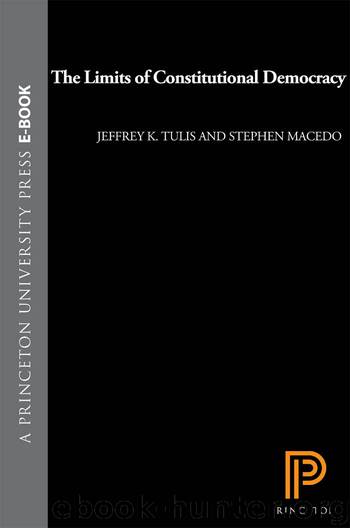The Limits of Constitutional Democracy by Tulis Jeffrey K.; Macedo Stephen; Tulis Jeffrey K. K. & Stephen Macedo

Author:Tulis, Jeffrey K.; Macedo, Stephen; Tulis, Jeffrey K. K. & Stephen Macedo
Language: eng
Format: epub
Publisher: Princeton University Press
Published: 2010-02-27T16:00:00+00:00
Secrecy and the Possibility of Rebuff
The second constitutional criterion advanced by the relational conception is the meaning of secrecy and the possibility of rebuff. We have already seen that at least one settlement account, that of Ely, considers secrecy as undermining of executive constitutional authority. Under Ely’s account, for an executive to act in secret curtails his authority insofar as Congress is blocked from the opportunity to revoke or amend the authorizations available to the president. Hence, secret executive war action, for Ely, always represents a constitutional problem.
Like Ely’s settlement account, the relational conception emphasizes the importance of the branches being engaged in practices of mutual review. This generates a strong imperative for the branches to publicize their deliberations to one another. But the relational account also sees that the meaning of secrecy can be different depending on the relationship of that secrecy to the conditions of conflict and security context of the moment. Secrecy, in other words, is of varying constitutional significance depending on its contribution to the system of interbranch deliberation.
In the case of Cuba and Cambodia, both presidents concealed what they were doing both for strategic international reasons and, more troubling, in order to avoid political interference. But there is a critical difference in the meaning of this evasion in each case. In Kennedy’s case, avoiding public judgment was in service of his capacity to formulate a distinctive perspective at all. Kennedy’s opponents were primed and eager to set a belligerent course with Cuba. Kennedy had reasonable grounds for fearing that once the placement of Soviet missiles was made public, and his deliberations were exposed, that political winds would be so strong that he would be unable to develop a distinctive perspective at all. His secrecy was related to the imperative of developing a plan of action. To immediately publicize the missile buildup when it was not clear what the executive branch’s judgment on the situation was could have significantly limited the scope of Kennedy’s deliberations.33 Kennedy thus forestalled the judgment of the other branches (the third condition) in order to shore up his capacity to develop a distinctive perspective (the second condition). Importantly, once this second condition was met and Kennedy had developed a position, he exposed his conclusions to Congress (and the public). He did not avoid congressional judgment any more than was necessary for developing his own position. It is also significant that the likely direction of congressional influence—toward more aggressive engagement with the Soviets—remained open for Kennedy, and hence the possibility of Congress enacting an alternate legislative preference was not forestalled by Kennedy’s failure to notify Congress earlier.
Nixon’s evasion of public judgment, by contrast, was not in service of developing a distinctive executive judgment on what should be done. Kissinger offered, as reasons for the administration’s “reticence,” the desire to “avoid forcing the North Vietnamese, Prince Sihanouk, and the Soviets and the Chinese into public reactions. A volunteered American statement would have obligated Hanoi to make a public response,” risking pushing Cambodia further into the arms of the North Vietnamese.
Download
This site does not store any files on its server. We only index and link to content provided by other sites. Please contact the content providers to delete copyright contents if any and email us, we'll remove relevant links or contents immediately.
| Anarchism | Communism & Socialism |
| Conservatism & Liberalism | Democracy |
| Fascism | Libertarianism |
| Nationalism | Radicalism |
| Utopian |
The Secret History by Donna Tartt(18160)
The Social Justice Warrior Handbook by Lisa De Pasquale(11952)
Thirteen Reasons Why by Jay Asher(8451)
This Is How You Lose Her by Junot Diaz(6437)
Weapons of Math Destruction by Cathy O'Neil(5829)
Zero to One by Peter Thiel(5489)
Beartown by Fredrik Backman(5357)
The Myth of the Strong Leader by Archie Brown(5238)
The Fire Next Time by James Baldwin(5016)
How Democracies Die by Steven Levitsky & Daniel Ziblatt(4958)
Promise Me, Dad by Joe Biden(4908)
Stone's Rules by Roger Stone(4857)
100 Deadly Skills by Clint Emerson(4690)
A Higher Loyalty: Truth, Lies, and Leadership by James Comey(4550)
Rise and Kill First by Ronen Bergman(4545)
Secrecy World by Jake Bernstein(4388)
The David Icke Guide to the Global Conspiracy (and how to end it) by David Icke(4380)
The Farm by Tom Rob Smith(4323)
The Doomsday Machine by Daniel Ellsberg(4245)
